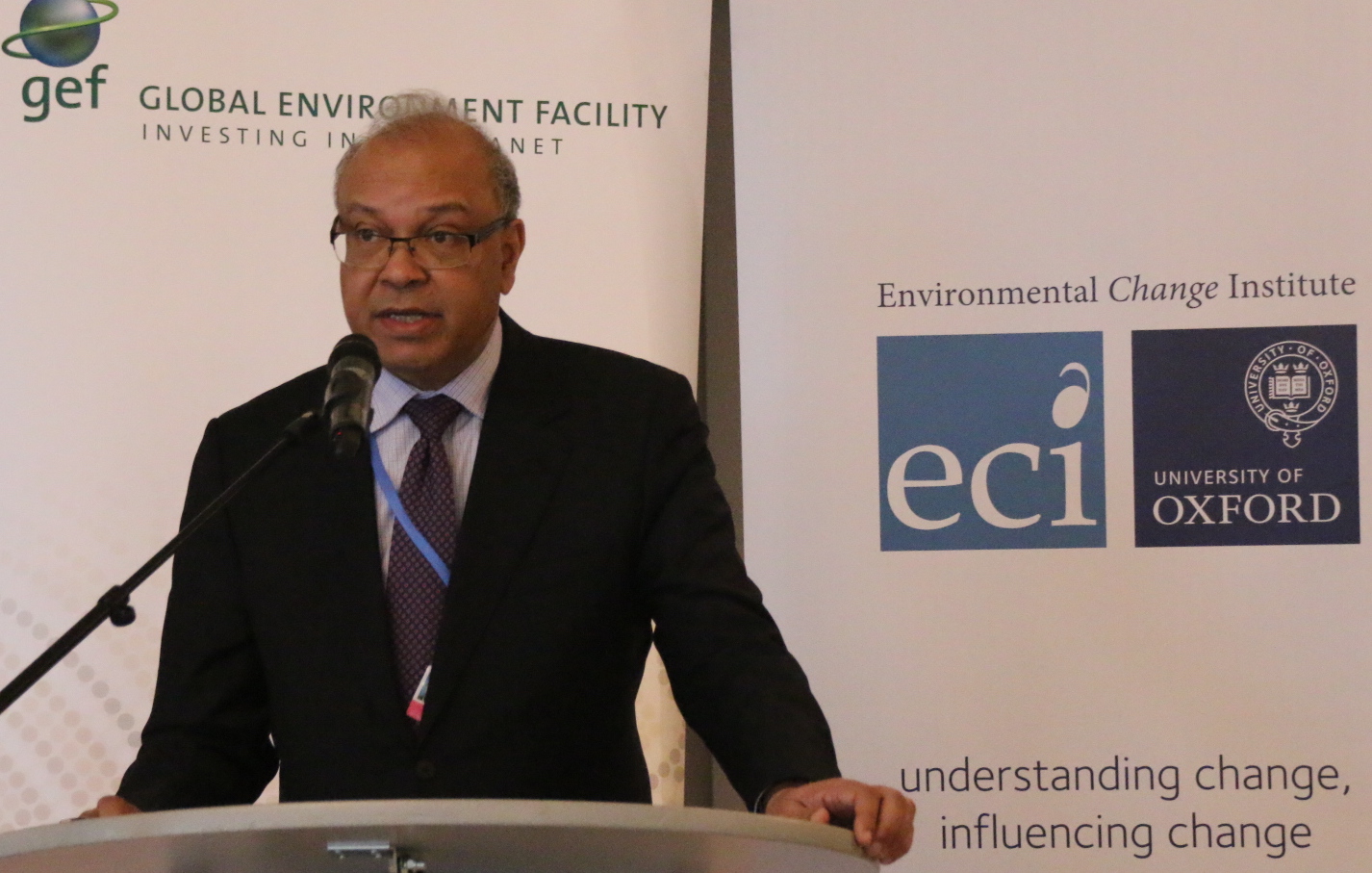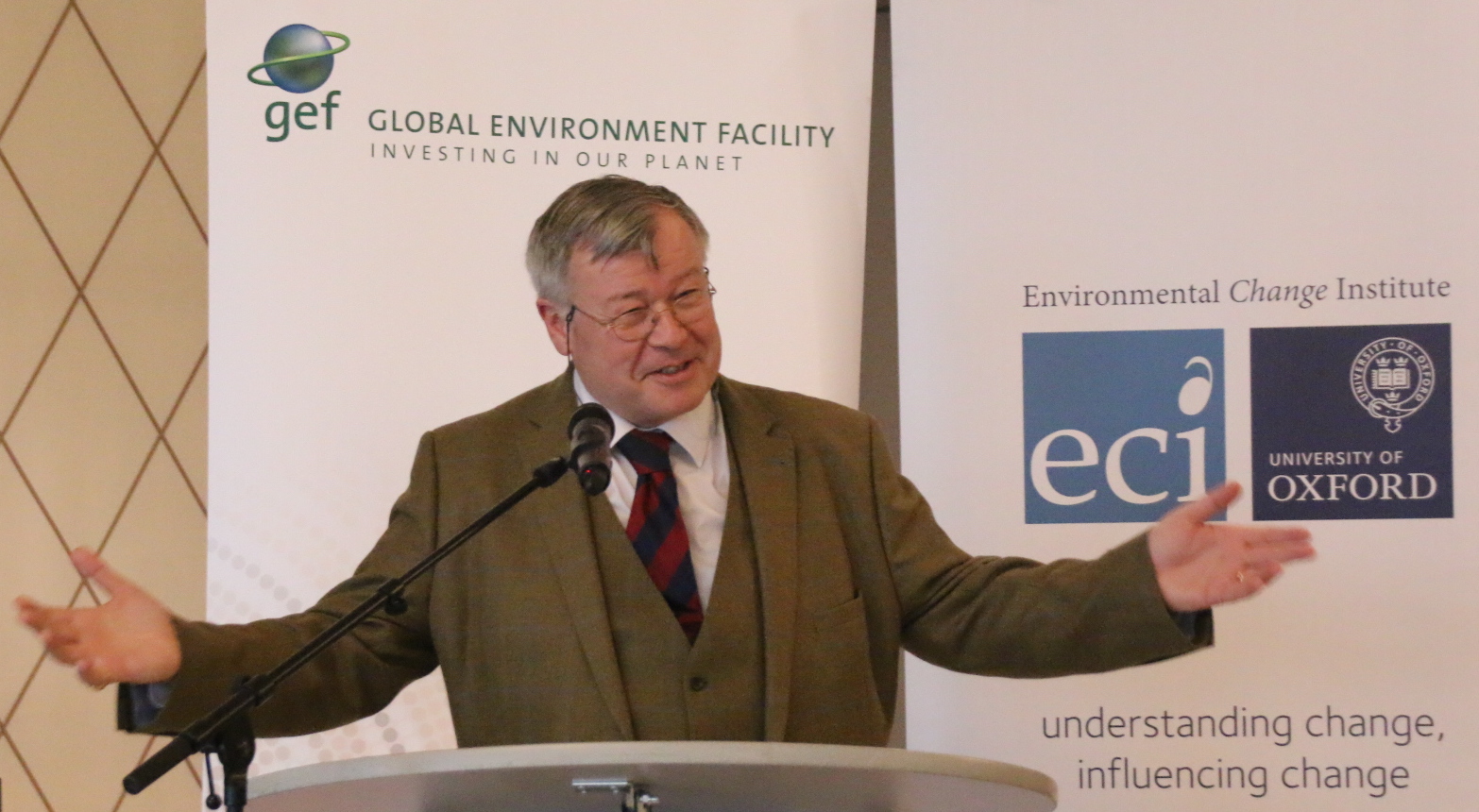
On 11 November 2017, a special event on the role of the UN Least Developed Countries Fund (LDCF) in promoting sub-national action on adaptation in and for LDCs was convened in Bonn, during COP23, by Oxford Climate Policy/ecbi and the Environmental Change Institute, with support from the Global Environment Facility (GEF). The event focused on action on the ground and financial support for adaptation, and the role of sub-national actors in providing both.
Following a welcome by Professor Benito Müller on behalf of the conveners, Emani Kumar, Deputy Secretary General of ICLEI, shared some keynote reflections on how ICLEI helps 1500 member cities to understand climate change and plan responses, through tools, awareness programmes and general capacity building. He also highlighted the gap between available finance and the financial needs of sub-national entities, saying they lack capacity to access climate finance, and to generate fundable project proposals
In the following opening panel on perspectives on catalysing adaptation action in LDCs, Lamin Dibba, Minister of Environment, Climate Change and Natural Resources of The Gambia, outlined how adaptation is dealt with in his country. He referred to a decentralisation strategy for dealing with The Gambia's top priority of building resilience to adverse impacts of climate change; and the lack of capacity at all levels of decision making. He also described the establishment of a Ministerial Council on Climate Change and the Gambian Climate Change Fund (recommended in an Independent Institutional Assessment by Anju Sharma, Head of the ecbi Publications and Policy Analysis Unit, that fed into the National Climate Change Policy of The Gambia).
Jozef Buys, LDCF Council Member and EU lead climate finance negotiator from Belgium, reminded the audience that the LDCF was actually established in Bonn 16 years ago (COP 6 bis) together with the Special Climate Change Fund. Belgium, Buys admitted, was initially reluctant to contribute to the new funds. This has changed, said Buys, and now, it is not only the Federal government, but also the Belgian region of Wallonia which in 2017 made its first contribution of €3.25 million to the LDCF. He then read out a letter by Jean-Luc Crucke, Walloon Minister of the Budget, Finance, Energy, and Climate addressed to the meeting, indicating that the region will also contribute in 2018. A formal announcement will be made in the second week of the COP, he said, highlighting that the government of the Walloon region considers the role of the LDCF to be essential in the Paris Agreement architecture, and in increasing support to both LDCs and adaptation.
Gustavo Fonseca, Director of Programs, GEF rounded off the opening panel with a brief account of the what the LDCF has achieved since its inception in 2001, including US$ 1.2 billion that have been awarded through the LDCF. He said the livelihoods of over 20 million people have been positively influenced by the funded projects, by reducing vulnerability and increasing resilience.
This was followed by a first thematic panel discussion, facilitated by Müller, on the provision of sub-national support for the LDCF. Tosi Mpanu-Mpanu, former LDC Group Chair and Co-Chair of the ecbi Advisory Committee, focussed on the importance of the Financial Mechanism in general, and of the LDCF in particular. He said one of the reasons multilateral funds such as the LDCF are important is that they can provide positive discrimination of funding areas such as adaptation, which are otherwise left behind in bilateral flows. As a long-time supporter of sub-national contributions to the LDCF from the beginning, he made an appeal to sub-nationals to follow the examples set by the Wallonia, Quebec, and Massachusetts.
Jean Lemire, Envoy for Climate Change and Arctic Affairs, Quebec then talked about the contribution to the LDCF from his government at COP 21 in Paris. Asked what the reason was for this contribution, Lemire answered that Quebec wanted to send a strong signal that sub-nationals can be part of the solution, and can play a key role in the global efforts to combat climate change. He said it is important for sub-nationals to show leadership, in the way in which Quebec and California did when they created the first carbon market between sub-nationals across national borders – a carbon market which incidentally provided the funds for the Quebec LDCF contribution. He concluded by expressing the hope that more and more sub-nationals would follow Quebec's signal and contribute to the LDCF.
Jim Cantwell, State Representative, Massachusetts, concluded the panel by explaining a recent piece of legislation in the Massachusetts State Senate that would enable individual donations to the LDCF. The Bill makes use of the fact that the majority of states (41), including Massachusetts, allow tax payers to earmark (‘check-off’) a share of any tax refunds on their personal income tax form as contribution to certain state programmes. These funds would be used to create a Massachusetts UN Least Developed Countries Fund (MLDCF) to be replenished through such tax refund ‘check-offs’, and any other public and private sector contributions for the benefit of the LDCF. Senator Barrett highlighted the ground-breaking aspect of the check-off programme proposed in his bill, namely that it would be the first time that American tax payers would be given the option to express solidarity with a global concern through such a scheme. In essence, the MLDCF is a government-led crowdfunding instrument with a very special type of marketing tool: income tax forms. When asked how this idea could be promoted across the US, he said that the best way is to lead by example and to show that it can be done for other states to replicate the success.
The second thematic panel discussion, facilitated by Achala C. Abeysinghe, Legal & Strategy Advisor to the Chair of the LDC Group and Head of the ecbi Training and Support Programme, showcased sub-national adaptation action in LDCs, particularly through LDCF funded activities and focused on three questions:
- What are the concrete resilience challenges you are facing at the city or district level in your country?
- What can cities to take leadership in adaptation?
- What are the sub-national adaptation priorities that can be best addressed through multilateral funds such as the LDCF?
Gebru Jember Endalew, Chair of the LDC Group, provided a broader overview on building resilience in LDCs, focussing on three challenges: planning, implementation, and reporting. He stressed the need for an integrated and coordinated approach, moving away from project-based to programmatic approaches.
The Chair's overview was followed by a presentation of two LDCF funded projects. Clara Mvogo, Mayor of Monrovia, Liberia and Owen Moses Chimphepo, District Commissioner of Mangochi, Malawi, described LDCF-funded projects in their regions. Finally, Hastings Chikoko, Regional Director for Africa, C40, shared a number of experiences from the over 90 member cities of the C40 network, focussing on Africa.
The event closed with a keynote address by Deo Saran, Climate Ambassador and Permanent Representative to the European Union, Fiji (COP23 Presidency). He noted that the need for funding considerably exceeds available resources, while commending the increasing interest of sub-national governments to contribute to the LDCF. He said this is an important signal that the poorest and most vulnerable communities of the planet are not to be left behind.
He also expressed the COP Presidency’s support and encouragement for other national and sub-national governments to make further contributions to the fund, because of its important role in the financial architecture, which is to focus on innovative adaptation projects, piloting and demonstrating adaptation technologies, techniques and practices and to lay the foundation for upscaling proven approaches by larger financial entities such as the Green Climate Fund.

